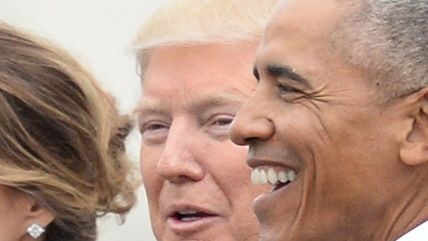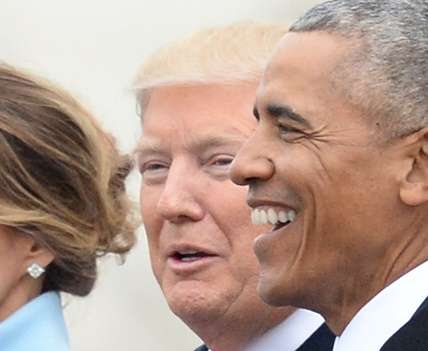Trump Redeclares War on Terror in Inaugural Address
A decades-long fight gets a new face.


Republicans got their wish today for a president that would utter the term "radical Islamic terrorism," when Donald Trump promised to "unite the civilized world against radical Islamic terrorism, which we will eradicate from the face of the Earth."
The use of the term became on issue on the campaign trail during the Republican primary season, one that stood in for the more complex question of how the war on terror ought to be conducted and what it meant. Trump's use of the phrase came along with an expansive definition of what the war on terror meant.
The Obama administration laid the groundwork for this. The post-9/11 authorization for the use of military force has been used for counter-terrorism operations in North Africa and the Middle East, the Indian Subcontinent, and West and East Africa. The U.S. has targeted groups like Boko Haram and Al-Shabab, as well as Al-Qaeda and ISIS affiliates in places like Libya and Afghanistan, whose fighters are often too young to remember the attacks of September 11, 2001, let alone to have anything to do with planning, authorizing, committing, or aiding the attack, or harboring organizations or people who did, as the AUMF stipulates.
Trump's promise to "reinforce old alliances and form new ones" suggests Trump is interested in expanding the global war on terror in places like Syria. Of the 26,000 bombs the U.S. was estimated to have dropped in 2016, about 12,000 are estimated to have been dropped on Syria, the most of any target country. Syria, along with Iraq and Afghanistan, are considered "areas of hostility" for U.S. government reporting purposes. The Obama administration insisted U.S. national security interests in Syria included the removal of Russia-ally Bashar Assad from power. Different parts of the U.S. government armed different sides of the conflict, some of which opposed each other. Disengaging from Syria and not permitting the Russian intervention to influence U.S. foreign policy-making is an altogether different prospect than aligning with Russia to prosecute the war on terror together.
"We will seek friendship and goodwill with the nations of the world, but we do so with the understanding that it is the right of all nations to put their own interests first," Trump said in his inaugural address—U.S. policy makers should ask whether America's best interests lie in more military operations around the world.
"We do not seek to impose our way of life on anyone," Trump continued, "but rather to let it shine as an example. We will shine for everyone to follow." That departed from Bush-era rhetoric. In his second inaugural address, President George W. Bush insisted that the "survival of liberty in our land increasingly depends on the success of liberty in other lands," and so it would be U.S. policy "to seek and support the growth of democratic movements and institutions in every nation and culture, with the ultimate goal of ending tyranny in our world."
Tyranny was Bush's go-to word for the war on terror—he didn't mention radical Islamic terrorism in his 2005 inaugural address. "There is only one force of history that can break the reign of hatred and resentment, and expose the pretensions of tyrants, and reward the hopes of the decent and tolerant," Bush said in that address, "and that is the force of human freedom." Freedom, of course, was another go-to word in talking about the war on terror.
Obama struck a similar tone, in 2009, describing the war on terror as a "war against a far-reaching network of violence and hatred" insisting Americans would "not apologize for our way of life, nor will we waver in its defense," and promising terrorists the U.S. would defeat them. During the 2012 election, the Obama campaign pushed a narrative that the administration had essentially won the war on terror—the president took credit for ending the Iraq war despite trying to postpone the withdrawal and claimed the war in Afghanistan is coming to a close (it remains ongoing). He called ISIS (which the U.S. is fighting in Iraq today ) a JV squad while continuing to expand the war on terror behind the scenes.
"A decade of war is now ending," Obama declared in his 2013 inaugural address—he was wrong; he left office as the first U.S. president to preside entirely during a time of war. "We, the people, still believe that enduring security and lasting peace do not require perpetual war," he observed. Yet both major candidates last year promised more of it, and Trump made his promise for the first time as president today. Sixteen years of bipartisan work on a culture of fear and paranoia about national security, and physical security and cyber security and any other kind of security fear mongers can exploit, is set to come into fruition under the Trump administration.
